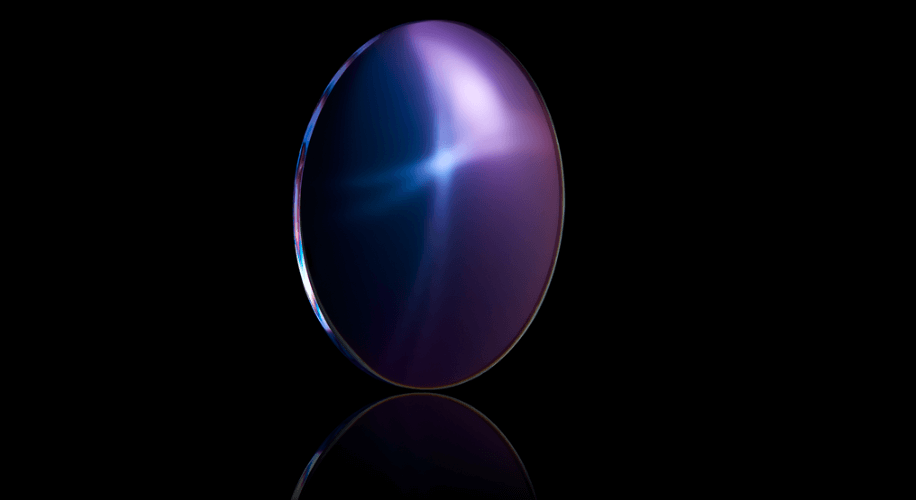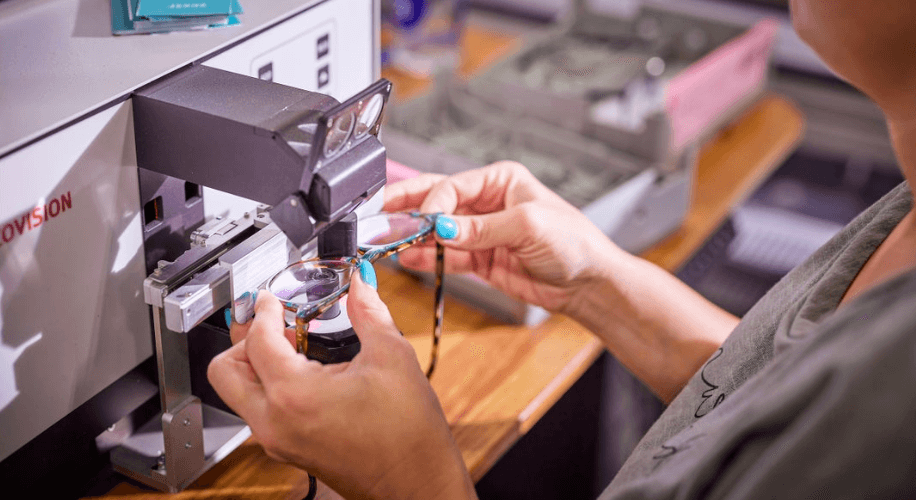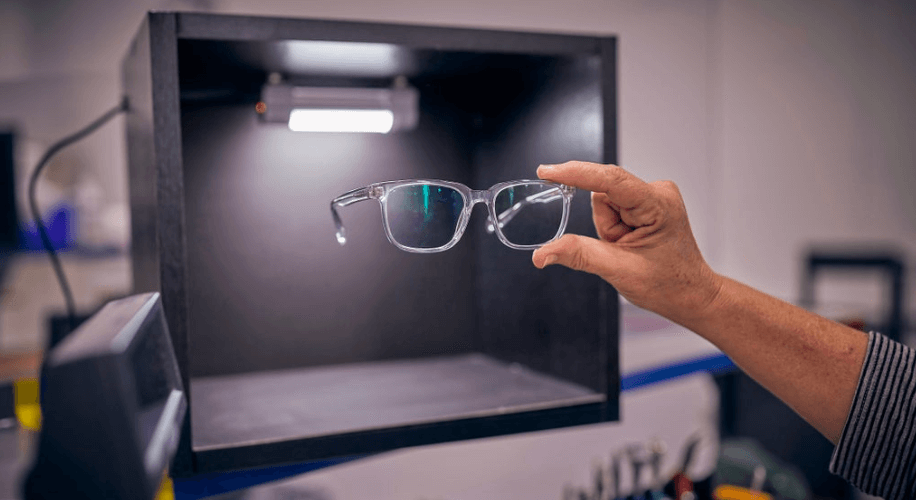Understanding the Benefits of Anti-Reflective Coating for Your Glasses
When you step into an eyeglass store, it’s common for the staff to suggest adding an anti-reflective coating (AR coating) to your eyeglass lenses. But why do your glasses need this coating, and what benefits does it offer? Let’s explore the world of AR coating and unveil the advantages it brings.

Enhanced Clarity and Light Transmission
AR coating plays a crucial role in eliminating glare from both the front and back surfaces of your lenses. Here’s why it matters:
- Sharper Vision: AR coating significantly improves the clarity of your vision by increasing the light transmission through your lenses. This enhancement is particularly noticeable with high-index lenses, which tend to reflect more light due to their higher refractive index. In simple terms, the higher the refractive index of the lens material, the more light it reflects. For instance, regular lenses reflect about 8% of light, allowing only 92% of visible light to reach your eyes. Conversely, high-index lenses can reflect up to 50% of light (approximately 12% of visible light), reducing the amount of light entering your eyes. This reduction can be particularly problematic in low-light conditions, such as nighttime driving.
- Ideal for Sunglasses: The benefits of AR coating extend to sunglasses as well. When you’re facing the sun, it helps eliminate reflections from the back surface of tinted lenses, ensuring clear vision.

Aesthetically Pleasing and Discreet
AR coating isn’t just about improved vision; it also enhances the appearance of your eyeglasses. Here’s how:
- Reduced Visible Reflections: AR coating not only reduces glare for you but also minimizes the reflections seen by others when they look at your lenses. By decreasing these reflections, AR coating makes your lenses almost invisible, allowing people to see your eyes and facial expressions more clearly.
- Enhanced Style: Glasses with AR coating not only provide better vision but also look more appealing. They help you put your best face forward, regardless of lighting conditions.

Reduced Glare and Eye Fatigue
If you spend long hours in front of a computer, AR-coated lenses can significantly improve your comfort compared to non-coated lenses. Here’s why:
Enhanced Comfort: AR-coated glasses reduce reflections from screens and artificial lighting, which can lead to eye strain and fatigue, especially during extended computer use.

Advanced Coatings for an Elevated Experience
Modern AR coatings offer additional benefits beyond glare reduction:
- Super Hydrophobic Coating: This coating prevents water droplets from forming on your lenses, making them easier to clean.
- Oleophobic Coating: It repels oil, making it easier to wipe away smudges and fingerprints.
Companies like Zenni Optical offer these advanced coatings at very reasonable prices. For example, their super hydrophobic coating is priced at just $8.95, and the oleophobic coating at $14.95. These coatings provide the same quality as those sold for over $200 in physical stores.

The Science Behind AR Coating
Applying AR coating to lenses involves a high-tech process known as vacuum coating. Here’s a simplified overview:
- Cleaning and Inspection: Lenses are meticulously cleaned, and both obvious and microscopic surface defects are inspected. Even the tiniest imperfections can affect the coating.
- Multi-Step Cleaning: Lenses undergo multiple cleaning steps, including ultrasonic cleaning to remove traces of surface contaminants. Then, they are dried and heated to eliminate excess moisture and gas.
- Coating Application: Lenses are mounted on metal supports with spring-loaded openings, ensuring stability and full exposure of all surfaces. These supports are placed inside a sealed coating chamber.
- Vacuum Environment: The chamber’s air is evacuated, creating a vacuum environment.
- Ion-Assisted Deposition: During the coating process, an electron gun directs a continuous stream of electrons at small crucibles containing metal oxide compounds. This converts them into vapor and fills the vacuum chamber with vaporized particles.
- Precise Layering: As the lenses rotate within the vacuum chamber, the vaporized particles settle onto the lens surfaces in precise layers, forming the multi-layer AR coating. Each manufacturer has its unique formula, but typically, AR coatings consist of layers of metal oxides with varying refractive indices.
- Final Inspection: Lenses are subjected to a final inspection to ensure the coating meets quality standards.

Caring for Your AR-Coated Lenses
To keep your AR-coated lenses in top condition:
- Use Recommended Cleaning Products: Only use cleaning products recommended by eyeglass professionals. Cleaning agents with harsh chemicals may damage the AR coating.
- Avoid Dry Cleaning: Never attempt to clean dry lenses with AR coating. Wiping dry lenses can scratch the coating. Always ensure the lenses are wet before cleaning.
- Protect from High Temperatures: Avoid exposing your glasses to high temperatures, such as leaving them in a sealed car during summer. High temperatures can cause the coating to deteriorate or peel off.
- Avoid Strong Solvents: Prevent your lenses from coming into contact with strong organic solvents like acetone, ethyl ether, and perfumes. These substances can affect the optical quality of the lens.

In summary, AR coating enhances your lenses’ durability, reduces glare, and makes cleaning easier. It also enhances your glasses’ appearance and, most importantly, your comfort. When shopping for eyeglasses, consider selecting AR-coated lenses. If you find prices high at physical stores, reputable online retailers like Zenni Optical offer excellent value, with standard AR coatings starting at just $4.95. Properly maintained AR-coated glasses promise a superior eyewear experience.
About the Author: Dr. Steven Lee
Dr. Steven Lee is a visionary leader in the eye care and telemedicine sectors and has built a remarkable career by combining his formal training in eye care, engineering expertise, and a passion for innovation. Dr. Lee serves as Zenni’s the Head of Optical Product.


 Canada
Canada